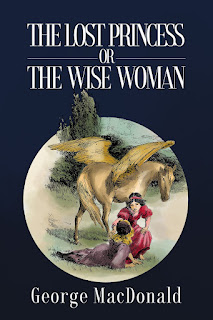Ulrich listens to old literature during his commute. He's gotten through the complete works of Sherlock Holmes, most of CS Lewis writing, George McDonald's catalog and Sumna Theologica by Thomas Aquinas. As much as I try to be well-read, he's on a different level.
When I was asking what we should do about Wednesday lenten services, he decided rather than taking the two older boys to church on Wednesday, he would lead them in a guided lesson using an audiobook.
I was curious. While taking Zander through his nightly routine, I've had my ears pricked to listen in on his nightly lessons with the kids.
The text he's chosen is "The Princess and the wise woman" by George Macdonald. In case you don't know who George Macdonald is, here is the first few lines from his wiki page.
"George MacDonald (10 December 1824 – 18 September 1905) was a Scottish author, poet and Christian Congregational minister. He became a pioneering figure in the field of modern fantasy literature and the mentor of fellow-writer Lewis Carroll. In addition to his fairy tales, MacDonald wrote several works of Christian theology, including several collections of sermons."
His books are interesting, quaint fantasies and fairy tales that often include moral lessons or teaching.
This particular story is about a spoiled princess who is a complete brat because her parents give her everything she wants. She is abducted by a wise woman who is straighten her out by teaching her to do chores and be content with what she's given. Of course this process is bumpy.
There is another girl, the daughter of a shepherd, who is content with what she's given and respectful to her parents. But her parents think she can do no wrong, and that girl has become quite proud, also thinking she can do no wrong.
Each chapter, Ulrich has a discussion with the boys about what just happened, what they think will happen and moral and ethical questions raised. The boys are honest. Telling him when they choose to be lazy or unhelpful, proud or envious.
The book has slowly worked on me. Making me think about how I was raised and what character flaws came from that. Making me think about how I am raising my boys and what character flaws may arise from that.
I have heavily used science and research on brain development to guide my parenting. What is reasonable to expect children of certain ages to be able to to do. How autistic brains are wired differently. How to help kids have a "growth mindset."
These simple stories from a simpler time are useful though. We live in an age of excess and it's hard to see how excessive our lives are when the reference point is also excessive.
Sin is such a loaded word. Used to condemn and exclude. Manipulate and control. But also a simple fact of life - we have short- comings, flaws and failures. Moments where we choose ourselves over other, where we lose courage to do the right thing.
I wrestle a lot over the nature of sin, especially in my children.
Disrespect or inability to communicate?
Selfishness or rigid?
Do I call this out or walk them through?
Am I too lenient or too strict?
There is a lot of pressure to give children everything they need to be successful in life. I think happy, healthy and well adjusted. There's also a lot of emphasis on developing core memories and a "happy childhood."
When I was new at parenting, this all felt overwhelming and exhausting. The bar felt way too high - managing screen time, eating healthiest possible food, pushing intellectual growth and keeping track of milestones - when they walked and talked and jumped with two feet -- all while working and trying to get enough sleep to keep my own health from coming off the rails.
Now, Eddie is heading to 16. Two and a half years it's all I have until he's considered an adult and I think a lot about how he's going to move through the world in his own. What skills does he still need and what personality flaws could lead him off track. How do I teach him to have his own moral compass -- or have i instilled this already in the way that I've raised him up?
I think my parents did a decent job with me and there are moments that make me feel like I'm doing OK with my boys. But, the reflection feels valid. "Sin" is not a lens I often use when I consider parenting choices. But sin is a thing that can, and does, derail our lives as much if not more than poor health, limited education or a lack of life skills.
When I think of my own growing pains, I had to wrestle a lot with pride and self-centeredness. I think "gifted" kids in the 90s got a lot of "you can do anything" handed to them and it's a long road to learn to be humble when you expect yourself to reach the stars.

No comments:
Post a Comment